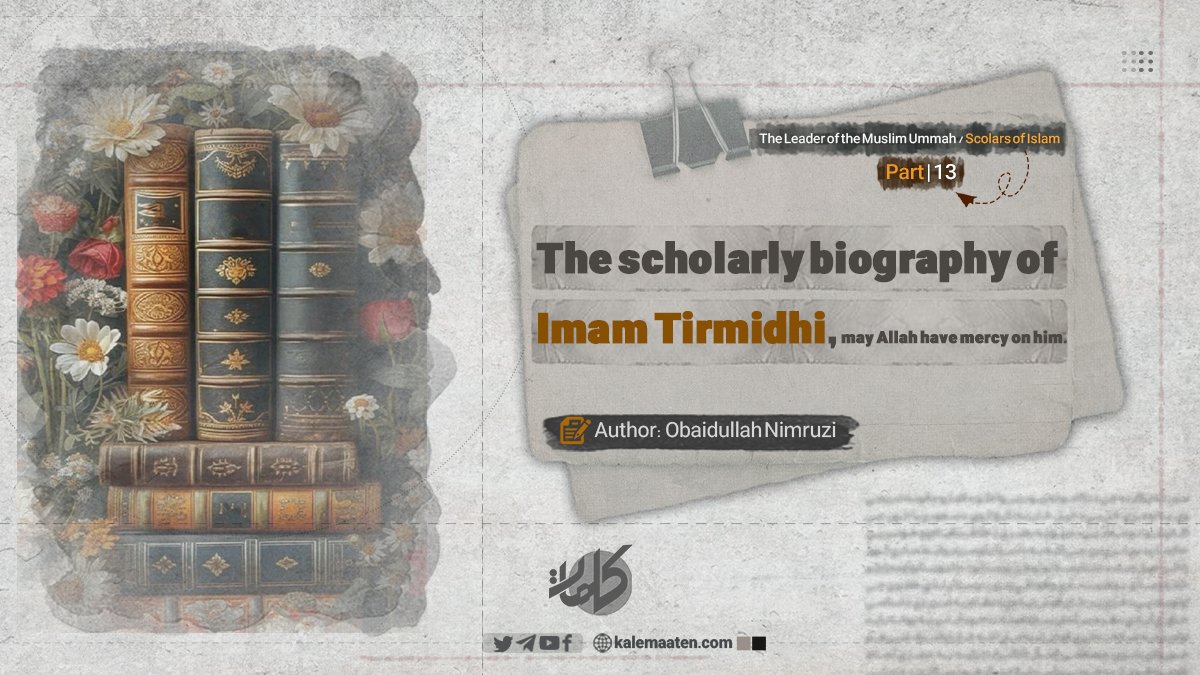
Author: Obaidullah Nimruzi
The Scholarly Biography of Imam Tirmidhi ‘may Allah have mercy on him’ (Part 13)
Definition of the Science of Hadith
The science of hadith is one of the most important and fundamental Islamic sciences presented as a means for the Ummah to connect with the Sunnah of the Messenger of Allah (PBUH). In defining this science, hadith scholars have offered various interpretations. Allama Badruddin Aini writes in his book Umda al-Qari, a commentary on Sahih al-Bukhari: “The science through which the sayings, actions, and circumstances of the Messenger of Allah (PBUH) are known.”
However, this definition is limited in scope, as it only includes Marfuh hadiths, i.e., those attributed to the Prophet (PBUH), without accounting for Moquf (attributed to the Sahaba) and Maqtuh (attributed to the Tabi’een). Hafiz Sakhawi provided a similar definition in his book Fath al-Mughith bi Sharh al-Fiyyah al-Hadith, stating: “The science of hadith is the knowledge of what is attributed to the Prophet (PBUH) in terms of words, actions, narrations, and attributes.”
To address the limitations of previous definitions and provide a more comprehensive understanding, a broader definition is offered in Fath al-Baqi bi Sharh al-Fiyyah al-Iraqi: “The knowledge of what is attributed to the Messenger of Allah (PBUH), his Sahaba, or anyone else in terms of words, actions, or narrations.” While this definition includes Maqtuh hadiths, some scholars have criticized it, arguing that the phrase “other than him” lacks a clear boundary and may lead to unreliable sayings and actions being categorized within the science of hadith.
Types of the Science of Hadith
The science of hadith is divided into two main branches:
1. The Science of Hadith by Narration (Al-Ravayah): This branch focuses on the recording of the sayings, actions, statements, and characteristics of Prophet Muhammad (peace be upon him). In essence, this aspect of hadith science serves as a treasure trove of Prophetic heritage that scholars of hadith have labored to document and transmit with great care.
2. The Science of Hadith by Knowledge (Al-Derayah): This part involves a detailed examination of the chain of transmission and the text of the hadiths. The objective of this branch is to determine the authenticity and validity of hadiths, distinguishing between authentic, weak, and questionable hadiths.
Different views have emerged regarding the subject matter of hadith science. Allama Kirmani posits that the “essence of the Prophet Muhammad (peace be upon him)” is the core subject of hadith science. However, this view has been challenged by Allama Muhyiddin Kafiji in his book Tadrib al-Rawi fi Sharh al-Qadr al-Nawawi, who states: “The essence of the Prophet (peace be upon him) may be a subject of medicine, but not the science of hadith.”
Conversely, Allama Suyuti refutes this criticism, explaining that Allama Kirmani refers not to the Prophet’s essence “in terms of what he is,” but rather “in terms of what he represents as the Messenger of Allah (peace be upon him).” In other words, the subject of hadith science encompasses the sayings, actions, and other matters of the Prophet (peace be upon him) as a prophet and messenger of Allah Almighty.
The Purpose and Goal of Hadith Science
The ultimate goal of hadith science is to follow the path and Sunnah of the Prophet (peace be upon him). The Holy Quran emphasizes this matter, stating: «لَقَدْ كَانَ لَكُمْ فِي رَسُولِ اللَّهِ أُسْوَةٌ حَسَنَةٌ لِمَنْ كَانَ يَرْجُو اللَّهَ وَالْيَوْمَ الْآخِرَ وَذَكَرَ اللَّهَ كَثِيرًا» Translation: “Indeed, you have in the Messenger of Allah an excellent example for those who hope in Allah and the Last Day and remember Allah much.”
Ibn Hajar Asqalani asserts in the introduction to his book Nuzhat al-Nazar: “The science of hadith is a precursor to acting on the Prophetic Sunnah and achieving happiness in both this world and the hereafter.”
The Virtue of the Science of Hadith
The science of hadith holds a unique honor and virtue because it is directly related to the Prophet Muhammad (peace be upon him) and his words and conduct. The Holy Quran states: «وَمَا آتَاكُمُ الرَّسُولُ فَخُذُوهُ وَمَا نَهَاكُمْ عَنْهُ فَانْتَهُوا» Translation: “And whatever the Messenger gives you, take it, and whatever he forbids you, abstain from it.”
Additionally, the Prophet Muhammad (PBUH) said in a famous hadith: “May Allah illuminate the face of the one who hears a hadith from us, memorizes it, and conveys it to others.”
Hafiz Ibn Abdul Barr, in his book Jami’ Bayan al-Ilm wa Fadlah, elaborates on the virtue of the science of hadith, stating that no knowledge is more noble and valuable than the knowledge that guides a person to know and follow the Prophet Muhammad (PBUH).
Types of Sciences
Many scholars categorize sciences into two primary types: narrative and intellectual. Each of these categories is further subdivided, detailed as follows:
1. Great Intellectual Sciences:
This category encompasses theoretical and philosophical sciences based on rational thinking and reasoning. Examples include philosophy, geomancy, divination, astronomy, and certain non-rational sciences related to cosmic and human predictions and analyses.
2. Great Narrative Sciences:
This category consists of religious sciences derived from sources of narration that deal with the interpretation and understanding of religion. Key examples include the interpretation of the Holy Quran, the science of hadith, Islamic jurisprudence, and the principles of jurisprudence.
3. Higher Intellectual Sciences:
This category includes the necessary tools for better understanding the great intellectual sciences. The most notable example is logic, which is recognized as a tool for rational thinking and the proper evaluation of arguments.
4. Higher Narrative Sciences:
This category aids in the accurate understanding of the great intellectual sciences and includes the branches of Arabic linguistics, such as morphology, syntax, rhetoric, semantics, and originality. These disciplines are especially beneficial in correctly interpreting the texts of the Quran and hadith.
Among these four categories, the great sciences, particularly the science of hadith, possess special value and significance and are considered essential for understanding and explaining religion.
Continues…


